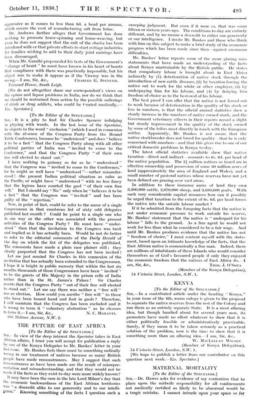THE FUTURE OF EAST AFRICA
' [To the Editor of the SPECTATOR.] SIR,—In view of the deep interest the Spectator takes in East African affairs, I trust you will accept for publication a reply by one of the Kenya Delegates to Mr. Bankes' letter in your last issue. Mr. Bankes feels there must be something radically wrong in our treatment of natives because so many British People have made remonstrances. May I suggest that such remonstrances as have been made are the result of misrepre- sentation and misunderstanding, and that they would not be made if the facts as they exist to-day-were more widely known? It may have been the case in the late Lord Miler's day that the economic backwardness of the East African territories was a discredit alike to our generosity and to our intelli- gence." Knowing something- of the facts I question such
sweeping judgment. But even if it were so, that was some fifteen or sixteen years ago. The conditions to-day are entirely different, and by no means a discredit to either our generosity or our intelligence. I invite Mr. Bankes and those who think- with him on this subject to make a brief study of the economic progress which has been made since then—against enormous difficulties.
Mr. Bankes' letter repeats some of the more glaring mis- statements that have made an understanding of the facts about Kenya unattainable by the British public. Ile states that compulsory labour is brought about hi East Africa indirectly by (1) deterioration of native stock through the introduction of new cattle diseases, (2) by taxation forcing tire native out to work for the white or other employer, (3) by underpaying him for his labour, and (4) by denying him freedom of choice as to the bestowal of his labour.
The best proof I can offer that the native is not forced out to work because of deterioration in the quality of his stock or loss in numbers, is that the official annual statistics shew a steady increase in the numbers of native owned stock, and the Government veterinary officers in their reports record a slight but steady improvement in the quality of the stock owned by some of the tribes most directly in touch with the European settler. Apparently, Mr. Bankes is not aware that the native stockbreeder does not breed for quality--that he is only concerned with numbers—and that this gives rise to one of our critical domestic problems in Kenya to-day.
The latest official statistics available sinew that native taxation—direct and indirect—amounts to Os. gd. per head of the native population. The 24 million natives so taxed are in effective ownership and possession of some 30 million acres of land (approximately the area of England and Wales), and a small number of pastoral natives whose reserves have not yet been defined are grazing over vast areas.
In addition to these immense areas of land they own 3,300,000 cattle, 2,670,000 sheep, and 3,680,000 goats. With such very considerable capital resources how can it possibly be urged that taxation to the extent of Os. 6d. per head forces the native into the outside labour market ?
If it be admitted from the foregoing facts that the native is not under economic pressure to work outside his reserve, Mr. Bankes' statement that the native is "underpaid for his labour" falls to the ground. As a free agent he would not work for less than what he considered to be a fair wage. And until Mr. Bankes produces evidence that the native has not " freedom of choice," I must content myself with the state- ment, based upon an intimate knowledge of the facts, that the East African native is economically a free man. Indeed, there are millions of inhabitants of these Islands who would consider themselves as of God's favoured people if only they enjoyed the economic freedom that the natives of East Africa do.—I (Member of the Kenya Delegation). 54 Victoria Street, London, S.W .1.








































 Previous page
Previous page